|
Horsebridge Road / 8 Sea Wall in 1871
Whitstable
01227 773133
http://www.pearsonsarmswhitstable.co.uk/
https://whatpub.com/pearsons-arms
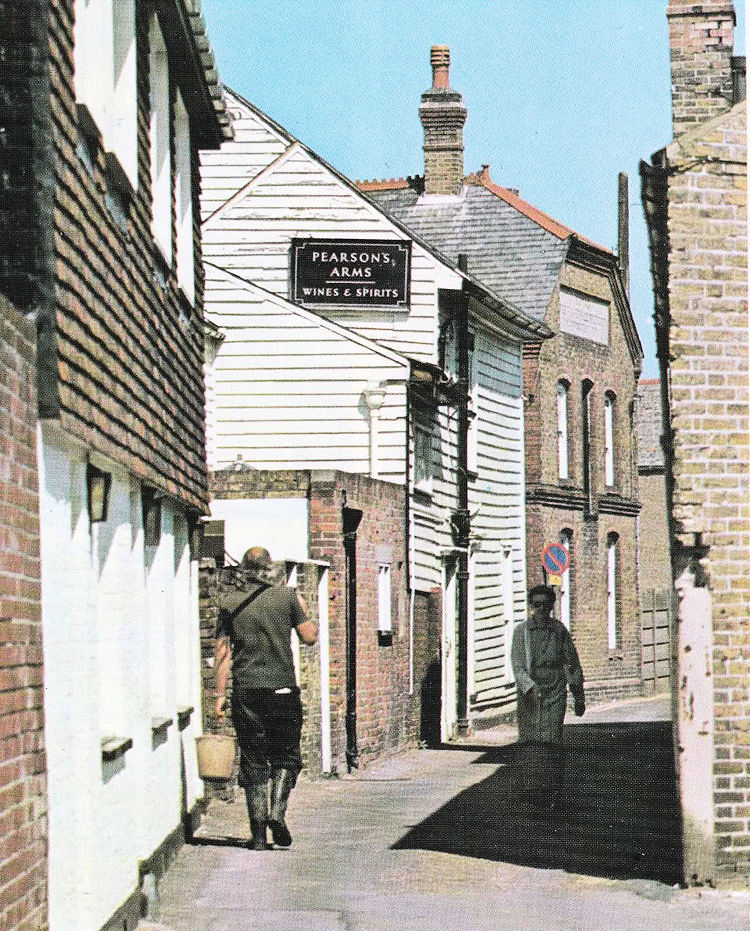
Above photo, date unknown. |
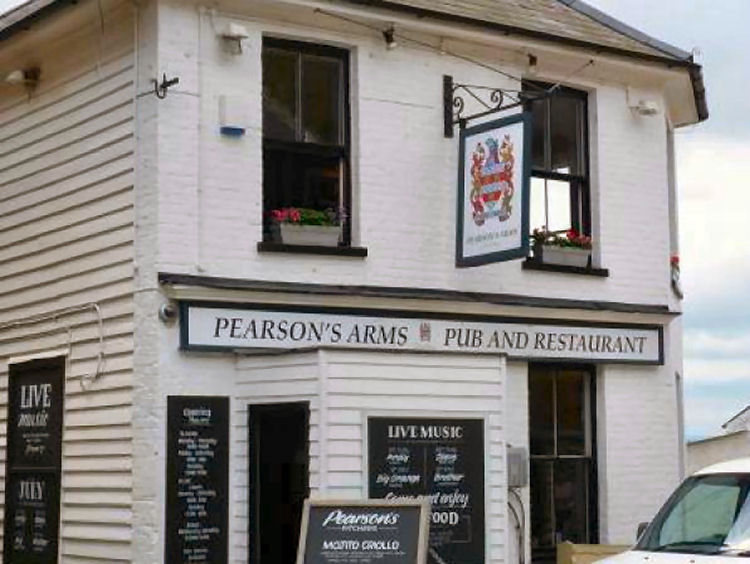
Above photo 2019. |
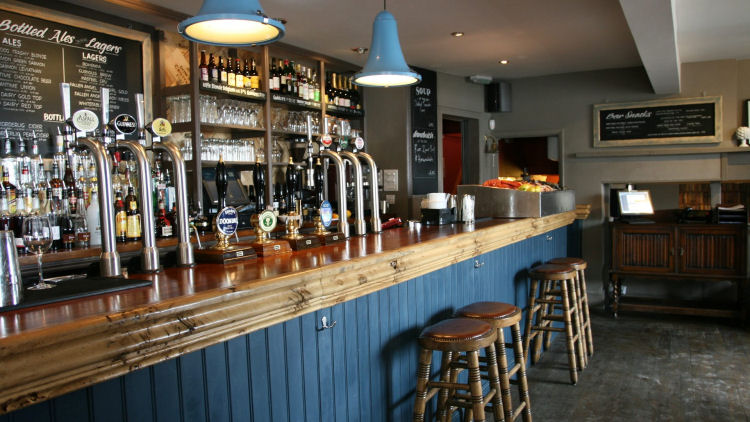
Above photo showing the bar 2019. |
 Above photo
showing the restaurant, 2019. |
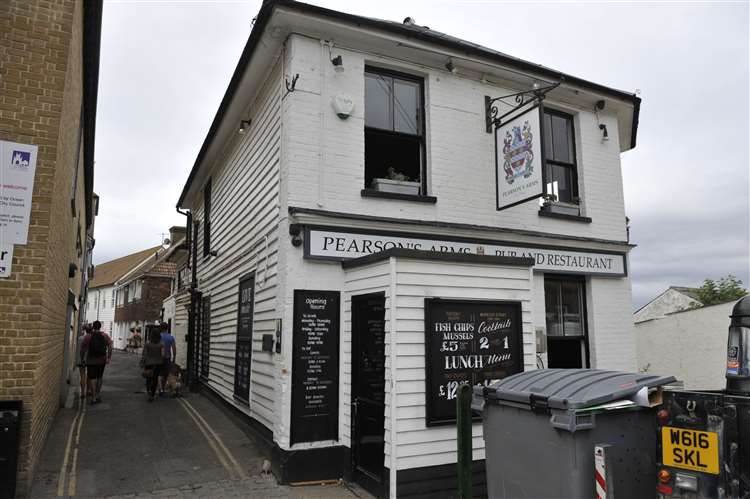
Above photo 2022. |
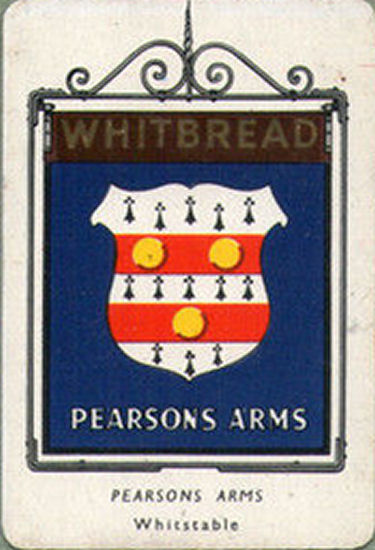
Above aluminium card issued June 1951. Sign series 3 number 25. |
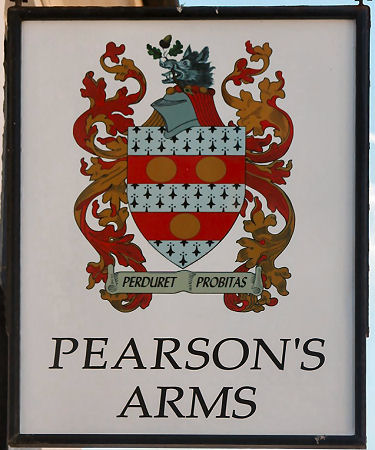 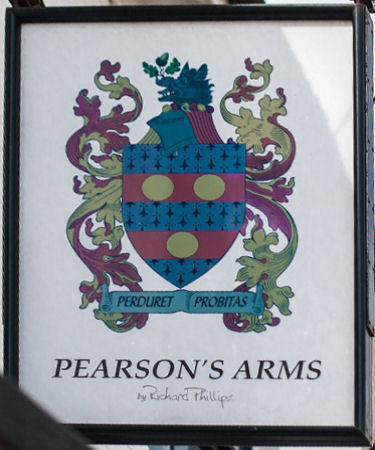
Above sign left, 2017, sign right, 2019. |
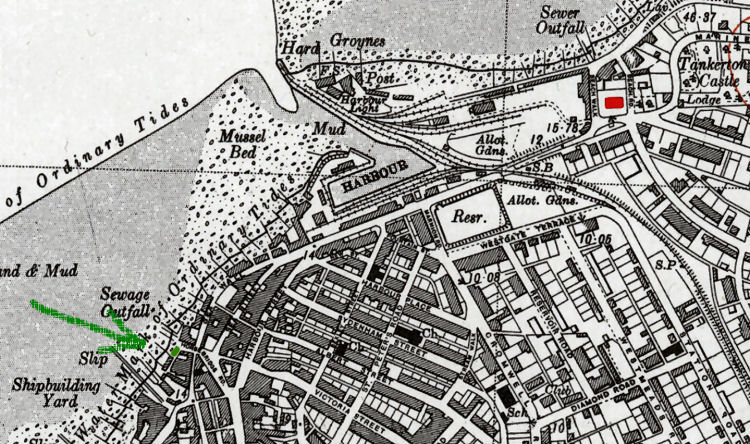
Above map showing the two locations of the pub. Green is original
pub on Tower Parade in 1830, Green current location at Horsebridge
Road from 1840 onwards. |
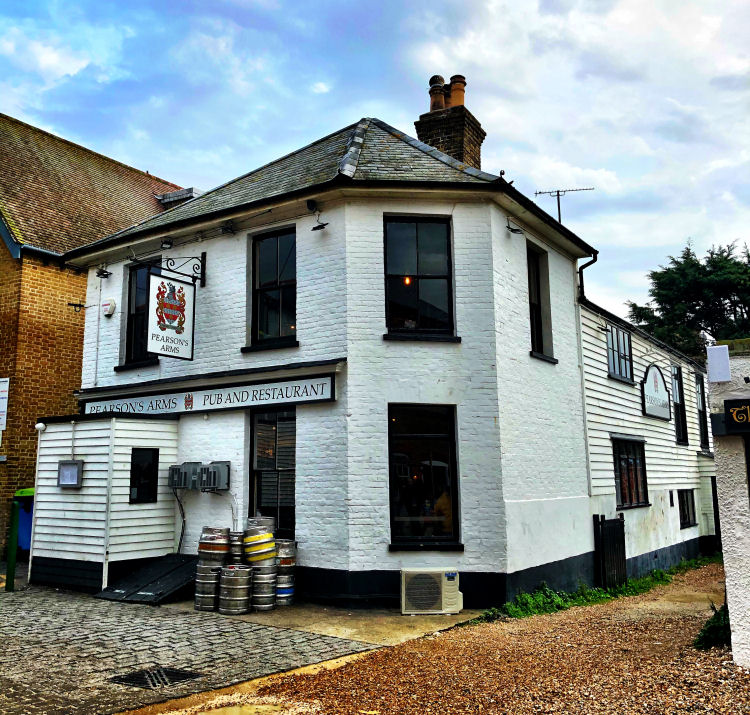
Above photo taken and sent by Shaun Gardener, October 2019. |
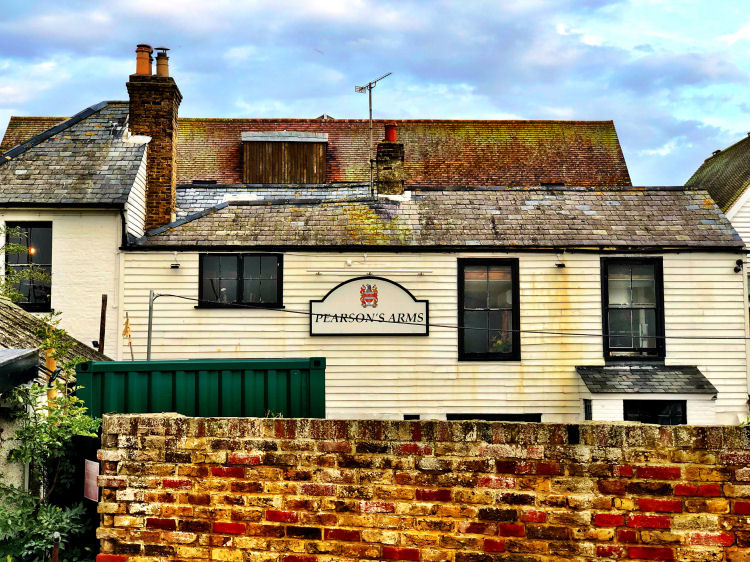
Above photo taken and sent by Shaun Gardener, October 2019. |
The Pearson's Arms originally stood on Tower Parade in the 1830s. It
moved to its location near Horsebridge Road in 1840s. The book "Whitstable
and Herne Bay Pubs by Johnny Horner" refers to the "Pearsons Arms" in its
current location as once being called the "Whitstable Arms."
|
Kent Herald, 28 August 1845.
Third Day Sale.
At the "Bear and Key," Whitstable.
Lot 1. A Freehold Public House, called the "Pearson's Arms," with yard, formerly
used as a coal store, situate near the Quay, in the parish of Whitstable,
occupied by Thomas Barnes. Also one Freehold Cottage adjoining, in the
occupation of James Sheaf.
|
|
Kentish Gazette, 17 February 1857.
Fire.
Between eleven and twelve o’clock on Wednesday se’nnight, a fire
broke out on the premises of Mr. G. Whitnall, the "Pearson Arms,"
situate near the beach. The inmates were aroused by the smoke
entering the apartment in which they were sleeping, and almost
suffocating them. The coast-guardsmen were quickly on the spot, and
soon got the fire under. It appeared to have originated in a
cupboard filled with children’s clothes, the contents of which were
consumed, but no further damage was sustained.
|
|
From the Kentish Gazette, 25 July 1865
St. Augustine's Petty Sessions. Saturday (Before
Wm. Delmar, Esq.,
Wm. Plummer, Esq., G. T. Tomlin Esq., and T. G. Peckham, Esq.)
Charge Against a Publican at Whitstable.
Robert Cole, landlord of the "Pearson’s Arms," Whitstable, was
summoned for having his house open for the sale of beer before
half-past twelve o’clock on Sunday, the 9th instant. The information
was laid by Supt. Walter, and evidence was culled to show that three
persons were at the bar with a pot of beer.
Two of them had just arrived from Canterbury by train, but the
third had resided for some time at Whitstable.
The landlord stated that he supplied a pot of beer to the
travellers, after they had shown him the railway tickets, but that
the other man had nothing.
Evidence to this effect having been called, the magistrates
dismissed the summons.
|
|
From http://www.whitstablecastle.co.uk/history accessed 21 January 2021.
THE FIRST MANOR HOUSE -THE PEARSON YEARS (1790-1835)
The first dwelling connected with the Copperas Works stood between where
the Castle is now and the Bowling Green. The Manor of Tankerton was
inherited by Elizabeth Radford of London, in 1773. She bought more land
and works and in 1780 married a London businessman and Freeman of the
Glovers Company, Charles Pearson. He bought several copperas works, but
the industry was by now in decline. Pearson began demolishing the
copperas works around 1790 and used the bricks to build an octagonal
tower.
The black tar of the works can still be seen on the walls. The Pearson's
home was known as The Manor House and little is known about its layout
except that in 1798 the chimney to the tower was taken down and a
staircase put in its place. Pearson frequently rode on horseback to his
London business, taking ten hours to reach Fleet Street.
By 1820 they had five children and were living in Greenwich, but every
summer they travelled by Thames Hoy to Kent. Pearson planned an
extension at the Tower to accommodate his large family. The family spent
the summer of 1821 at the enlarged home, bringing maids and bedding down
by Hoy as they did not own a carriage. The local copperas industry was
by now finished, larger deposits having been found in Yorkshire. Charles
Pearson now embarked on a new venture "The Canterbury and Whitstable
Railway" to link Canterbury traders with the Harbour. A company was
formed with Pearson as one of the owners and main investor together with
notable pioneers of the railway age, including George Stephenson. The
railway was planned to end on land Pearson owned to the east of the
harbour where he built a station, but there was opposition to this and
the line finished at the harbour instead. Pearson, always eager not to
miss an opportunity turned his station into a hotel. This became the
first "Pearson's Arms". The building of the railway ran into delays and
financial difficulties.
Charles Pearson died in 1828, two years before the railway opened. His
son Charles Pearson Junior, born in 1786, inherited the estate and
carried on using the house as a summer residence. He married Eliza,
daughter of the wealthy Lord Delaware, in 1810. The Tower fell into
neglect and he sold it to his cousin by marriage Wynn Ellis.
|
|
From the book Whitstable and Herne Bay Pubs by Johnny Horner.
Today's "Pearson's Arms" is a swish and ever so slightly
upmarket gastropub, which has 'celebrity' chef Richard Phillips
overseeing operations. Located close to the Horsebridge, just yards from
the beach, its exterior of white weatherboarding is old Whitstable
defined while the shabby chic of the interior very much reflects at
least one side of the town today. However, this well-appointed old pub's
long history can boast a few dark chapters down the years, with suicide,
drunkenness and what a police report in the late nineteenth century
described as 'loose women' all involved.
The "Pearson's Arms" originally stood on Tower Parade, where today
you'll find the Wynn Ellis Almshouses. It was opened by Charles Pearson
junior in the early 1830s. In 1828, he inherited a substantial estate
after the death of his father, Charles senior, who had made his fortune
from the copperas industry, which thrived for many years in Tankerton.
Copperas was a local mineral that, once processed, was used in textile
dyeing. What is today known as Whitstable Castle was built by Pearson
senior as the family's grand Kent home. Pearson junior's original
"Pearson's Arms" was a speculative project built in the hope that when
the railway arrived in Whitstable the line would be driven to the nearby
beach. Instead, Whitstable Harbour was constructed and the Tower Hill
pub proved a failure."
The Suicide of George Cocks.
In the late 1840s, the "Pearson's Arms" was resurrected at its
current location in what was previously the "Whitstable Arms," occupying
a small cottage, parts of which can be seen to the rear. The pub was
popular with the dredgermen who worked nearby - thirsty work dredging is
- and was also a hang out for smugglers, who thrived in Whitstable.
Canterbury brewer Ash and Co. owned the pub in the 1860s, but it seems
to have acquired a bad reputation. Apparently, the landlord did not only
like a drink himself, but he encouraged the aforementioned 'loose women'
and for a time in 1864 the pub's license was withheld. The pub's darkest
hour came in 1881, when landlord George Cocks was found head down in a
water butt. Although attempts were made to revive him, he was already
dead, and at an inquest held soon after, a verdict of suicide delivered
by the East Kent coroner. It was later revealed that Cock's relationship
with his wife was a troubled one. Apparently, Mrs Cocks was not averse
to waving a knife in his general direction. He, it seems, was driven to
take his own life. The Pearson family's coat of arms still adorns the
pub sign. The motto in Latin reads Perduret probitas, which translates
as 'Integrity endures'.
|
|
Kentish Weekly Post or Canterbury Journal, Tuesday 26 May 1835.
Pearson's Arms, Whitstable. Thomas Barnes begs to inform his friends and
the public, that the above hotel being required by the proprietor for
another purpose, he has removed his licence to the residence of the late
Mr. James Robertson (situated on the Wall leading from the Harbour)
where he has fitted up apartments commanding a delightful sea view, and
respectfully solicitors a continuance of those favours so liberally
bestowed upon him last season, and for which he returns his sincere
thanks.
Tea parties &c. accommodated, and every refreshment on moderate terms. N. B. Bathing machines, and a commodious Billiard Room. Stabling, &c. Whitstable, 7th May, 1835. |
|
From the Kentish Gazette, 2 September 1845.
THIRD DAY'S SALE.
At the "BEAR and KEY," WHITSTABLE.
Lot 1.- A freehold public house, called the "Pearson's Arms," with yard,
formerly used as a cold store, situated near the Quay, in the parish of
Whitstable, occupied by Thomas Barnes. Also one freehold Cottage
adjoining, in the occupation of James Sheaf.
|
|
From the Kentish Chronicle and General Advertiser, 7 September, 1861. Price 1 1/2d.
ASSAULT CASE AT WHITSTABLE.
At St. Augustine's Petty Sessions, on Saturday last, two married women,
Rosa Shoveller and Mary Fullager, were charged with unlawfully
assaulting and beating Martha Rigden.
Mr. Delasaux appeared for the defendants.
The complainant deposed that on the previous Thursday, the 20th August,
about five o’clock in the afternoon, she was walking along by the
“Pearson’s Arms,” when Mrs. Shoveller came out of the shoemaker's shop,
tore her hat off her head, slapped her face, pulled her hair, and then
said, “Now go and lie again about me.” Just afterwards, Mrs. Fullager,
who had been looking on, also went up to complainant, boxed her ears,
and knocked her head against the side of the door. Fullager was ordered
away, when the other defendant attacked complainant, and after knocking
her against the wall, said, “Now I will leave you.” Mrs. Foyer then went
for a policeman, and while she was gone the defendant Shoveller again
struck complainant in the face. She produced the hat, which Mrs.
Shoveller had torn in the manner it then appeared, she did not strike or
say anything to defendants.
In cross examination by Mr. Delasaux, the complainant said that she did
nothing to either of the defendant. She only said that Mrs. Shoveller
was not fit to go with any young girl. She had also said Mrs. Shoveller
had stated that she did not like her husband, and she should not mind
giving him slow poison. She had also said that Mrs. Fullagar had tried
to lead her (complainant) astray. She had said that Mrs. Shoveller was
good for nothing, or she would not be walking in the streets with other
men. She did not say anything about Mrs. Fullager until after she had
struck her, but what she said about Mrs. Shoveller was said about a week
previous to the assault.
Elizabeth Stammas proved seeing the two defendants go up to the
complainant, strike her in the face, and pull her hat off her head.
Ellen Foyer confirmed the complainant’s evidence as to the attack made
upon her by the defendants.
Mr Delasaux then addressed the bench for the defendants. He said it was
expected that the assault would have been heard in two separate charges,
and had it been so he world have called his clients as witnesses, but as
it had been made one charge, their mouths were closed. He spoke of the
improbability of the defendants attacking the complainant in the way she
had stated, and then went on to observe that the complainant had made
re-presentations to the defendants of a nature calculated to induce a
breach of the peace. He did not deny that an assault had been committed,
but maintained that aggravating circumstances had led to it.
The Bench ordered each of the defendants to pay a fine of 10s and 8s.
9d. costs, or 14 days’ imprisonment. A week was allowed for payment.
|
|
Kentish Chronicle, Saturday, 14th November 1863.
There was an application to transfer the licence of the "Pearson's
Arms," Whitstable, from Thomas Ward, to John Caldwell, but P.C. Tucker
informed the bench that Caldwell had been formally convicted at
Maidstone, of offences against the Licensing Act. In proof of this
statement he produced copies of the convictions. On the last occasion,
in June, 1863, Caldwell was fined £3 and costs.
The Chairman said, under these circumstances the Bench could not grant
the licence to Caldwell.
It having been mentioned to the Bench that Messrs. Ash were the owners
of the house, the Clerk suggested that they should be apprised of the
decision of the Bench.
Mr. Ash's Clerk shortly after entered the Court, and produce a written
character which he had obtained from Mr. Mason, under whom Caldwell held
a house at Maidstone. He suggested the Bench should let Caldwell have a
licence on probation, as he had been in the house for two or three
months, and there had been no complaints made against him.
P.C. Hoad said that the "Pearson's Arms" was one of the worst conducted
houses in Whitstable. On the 5th inst the police were called to clear
the house. Mr. Ash's Clerk considered that the 5th November was an
exceptional day, and as Caldwell had promised to conduct the house
better in future, the bench should grant him a licence.
The court, however, refused the application.
|
|
Kentish Chronicle, Saturday 9 January 1864.
Refusal to Licence a Public House.
Mr. Callaway, solicitor, applied to the magistrates, on behalf of
Messrs. Ash, brewers, to renew the licence of the "Pearsons Arms" to
landlord John Caldwell. He explained that at the time and application
was made by Caldwell to have licence of the inn transferred to him, the
magistrates refused to comply with the request, in consequence of he
(Caldwell) having been convicted for offences against the Beerhouse Act
at Maidstone, and permission only to sell up to that day (Saturday) was
granted him. He (Mr. Caldwell) held in his hand a certificate signed by
a good many respectable folk living in Whitstable, testifying to the
credible manner in which Caldwell had kept his house. Bates, the police
officer at Whitstable, was questioned as to how the house had been
conducted, and he gave a very indifferent account concerning it, stating
that the inn was kept open until early hours in the morning, and that
recently he had had occasion to eject women of bad character from it.
The magistrates refused to renew the permission to sell to Caldwell.
|
|
From the Whitstable Times and Herne Bay Herald. 23 November 1867. Price 1d.
COUNTY POLICE COURT
At the County Police Court, on Saturday last, James Food was charged
with keeping a disorderly house, on the 5th November. Sergeant Grower deposed that he was on duty at Whitstable on Tuesday,
the 6th of November, and between 10 and 11 o'clock, he heard the reports
of fireworks, which he thought were being let off in defendant's house,
the “Pearson's Arms.” He went in the house, and found that it was full
of smoke. Defendant was supplying the men inside with beer as fast as
possible, and witness complained to him, and told him he should report
him for keeping a disorderly house. Defendant answered that he could not
prevent the men from making a noise. Witness then left the house, and
went in again at about 12 o'clock, when the persons inside were still
letting off fireworks, some of the men having blackened faces, while
others were drunk. He succeeded in clearing the house at about half-past
12. Defendant said he asked the police sergeant to clear the house the first
time he came, but instead of doing so, he immediately left the house. P.C. Fry was called and corroborated the statement of Sergeant Gower. Defendant was fined 10s., and the costs, 10s. |
|
The Canterbury and Vicinity Directory – Commercial - Oystertown. Saturday, 2 April 1881.
Driven to suicide.
On Monday afternoon the East Kent Coroner, T. T. Delasaux, Esq., held
and inquest at the "Pearson's Arms Inn," Whitstable, on the body of
George Cock, the landlord of the house, aged 39 years, who committed
suicide on Sunday by drowning himself in a water-butt.
Florence Croft and stated that on Sunday afternoon, about 4:30, she went
into the yard at the back of the deceased's house and saw his body in a
water butt. His legs were hanging over the side of the tub. She obtained
assistance and afterwards saw the deceased, who was dead. She had been
staying in the house, during which time the deceased had been low and
melancholy.
Thomas Bartlett, diver, stated that on Sunday afternoon he was called to
the yard of the deceased house and they found him in a water-butt. His
head was covered, and his legs were hanging out of the butt. Witness
took him out, he was quite dead and cold, and had evidently been
drowned. Witness was quite certain that deceased could not have
accidentally fallen into the butt, and believed it to have been his own
act. For the last three weeks he had observed that the deceased was low
and melancholy, and he told witness he should drown himself, adding that
his wife would drive him to commit the act. Witnesses heard frequent
quarrelling between them, and on Sunday afternoon, about 1:15, he saw
Mrs. Pearson strike at her husband with a knife, but the deceased kept
off the blow by putting up his arm. His wife was continually quarrelling
with him.
Edward curling, labourer, said he saw the deceased on Saturday morning
about 7 o'clock, when he appeared very low spirited, and witness did not
believe he knew what he was doing.
At this point the jury wish the enquiry adjourned in to allow of a post
mortem examination to be made.
An adjournment was accordingly made until Tuesday afternoon, when Mr. J.
W. Hayward, surgeon, gave the result of a post mortem he had made, which
showed that death did not arise from poisoning or from any diseased
organs. Witness was satisfied that death was caused by suffocation and
drowning.
The jury then returned a verdict of suicide while in a state of
temporary insanity, and they added that they could not help observing
that they believe the act of suicide was caused by the violent conduct
of the wife of the deceased.
|
|
Whitstable Times and Herne Bay Herald 19 November 1910.
SPECIAL NOTICE, W. DORRINGTON.
Of the "Blue Anchor," Seasalter.
Begs to Thank his many Friends (both old and new) for past patronage,
and to inform them that he is taking over the "Pearson's Arms,"
Whitstable, on December 6th. Next, where he will be pleased to see them
after 6 p.m.
Don't forget to drop in as there will always be a snack on hand. Tea and
Coffee after 6 a.m., and as usual everything of the best. All
proprietary brands will be stocked.
Ash and Co.'s Fine Ales A Speciality.
|
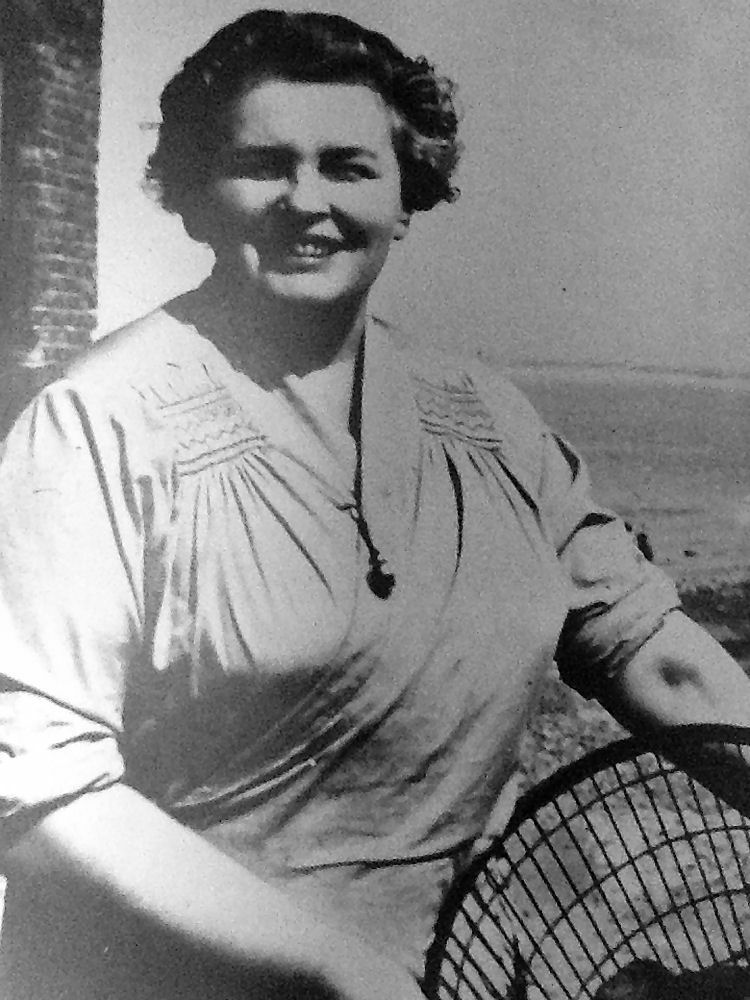
Above photo of Miss Beryl Waters. Circa 1935. |
|
From the
https://www.kentonline.co.uk By Lynn Cox, 11 December 2022.
Drunk chef Jayden Holman broke into Pearsons Arms and Cheadles Chemist in Whitstable.
A disgruntled chef claims he broke into his former employer’s pub
because he was owed wages - before causing almost £10,000 of damage in a
pharmacy raid.
Jayden Holman burgled the Pearson’s Arms in Whitstable, before
ransacking Cheadles Chemist on the High Street, leaving a trail of
destruction.
Holman, of no fixed address but from the Whitstable area, was drunk when
he smashed his way into the pub in Horsebridge Road during the early
hours of October 13.
The 20-year-old climbed up a drainpipe and broke windows to get inside,
before stealing two bottles of booze from the bar and leaving fridges
open, ruining the food inside.
A cup containing small change was also reported missing.
Holman told a probation officer he carried out the burglary because he
was owed wages, although no evidence was presented to the court.
The officer said: “He had been working long hours and worked for the
pub.
“He told me he was owed money and he’d been working up to 93 hours a
week.
“He’d had a fallout with one of his employers and they owed him money.
He had not been paid and that’s why he did the burglary - he had not
been paid properly.
“He has a job ready at the "Monument" pub on his release.”
A few days after the pub break-in, Holman was arrested after trying to
steal a bike from outside McDonald’s in St George’s St, Canterbury,
using a hammer to free it from its locking chain.
Holman was later charged with the burglary at the pub, attempted theft
of the bike and going equipped for theft in relation to the hammer.
However, while on bail in November, Holman broke into the Cheadles
Chemist in Whitstable.
As he entered the building, he damaged computers and then rifled through
the building looking for things to steal.
He left a fridge full of medication open and stole two boxes of breast
cancer drugs from inside.
Police were called after alarms inside the building went off and Holman
was found still inside in a drunken state.
He started to abuse officers and even shouted at a woman walking past.
Holman admitted both burglaries when he appeared at Folkestone
Magistrates’ Court.
Magistrates were told he had also pleaded guilty to the other offences
at an earlier hearing.
Julie Farbrace, prosecuting, told the court the damage to the pharmacy
totalled £9,523, mainly because Holman had left a fridge full of
medication open which had to be thrown away.
Ms Farbrace said: “The break in had a massive financial impact on the
business and customers couldn’t get their meds and the nearby doctor’s
surgery couldn’t issue prescriptions to the pharmacy.”
She told magistrates the pub also suffered a financial loss as damage
cost £970 to repair. Food left in open fridges also had to be thrown
away at a cost of £523.94.
The court heard both businesses were able to claim on their insurance
for the damage, but the chemist had to pay £500 excess and the pub
£1,000.
The bench was told Holman had no previous convictions apart from a
caution he had been given earlier this year, and that he had carried out
the spate of criminal activity while suffering mental health issues and
binge drinking.
Magistrates jailed Holman for 12 months for both burglaries, but
suspended the term for 12 months.
He must also complete a nine-month alcohol treatment requirement and 25
rehabilitation sessions with probation.
Holman was also ordered to pay £500 compensation to the chemist and
£1,000 to the pub.
He was also fined £50 for going equipped for theft and £50 for the
attempted theft of the bike. |
LICENSEE LIST
LOVEGROVE Mr 1833+
BARNES Thomas 1835-45+

BEAL James 1847+
WHITNAL George 1851-58+ (age 57 in 1851 ) )
HOOKER Henry to May/186
 (Pearsons Arms)
(Pearsons Arms)
WARD Thomas May/1862+
 (Pearsons Arms)
(Pearsons Arms)
CALDWELL John June-Nov/1863 (licensed refused)

COLE Robert 1865+
WEBSTER Benjamin 1871-74+ (age 58 in 1871 ) )
WELLS to Nov/1880

COOPER Edmund Nov/1880+

COCKS George to Apr/1881 dec'd
COCKS Mary Ann Apr/1881+ (widow age 36 in 1881 ) )
GARDENER Robert 1889-1903+ (age 68 in 1901 ) )

 DORRINGTON William Nov/1910-11+ (age 43 in 1911
DORRINGTON William Nov/1910-11+ (age 43 in 1911 ) )
RIGDEN H W 1913+
RIGDEN Clementine to July/1913

OLIVE Stephen William July/1913-18+

REED Maud R Mrs 1922+
CHENEY G A 1924-30+

WATERS Charles William 1934-39+ (age 58 in 1939)
https://pubwiki.co.uk/PearsonsHotel.shtml
 From the Pigot's Directory 1840 From the Pigot's Directory 1840
 Whitstable Times
and Herne Bay Herald Whitstable Times
and Herne Bay Herald
 Census Census
 Kentish
Chronicle Kentish
Chronicle
 From the Kelly's Directory 1903 From the Kelly's Directory 1903
 From the Kelly's Directory 1924 From the Kelly's Directory 1924
|











